七年级英语下册Unit4重点短语概括复习人教新目标版PPT课件
- 格式:ppt
- 大小:282.00 KB
- 文档页数:11
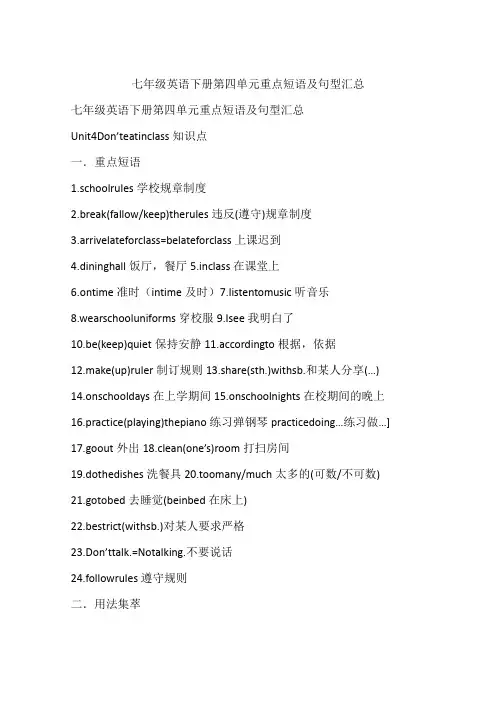
七年级英语下册第四单元重点短语及句型汇总七年级英语下册第四单元重点短语及句型汇总Unit4Don’teatinclass知识点一.重点短语1.schoolrules学校规章制度2.break(fallow/keep)therules违反(遵守)规章制度3.arrivelateforclass=belateforclass上课迟到4.dininghall饭厅,餐厅5.inclass在课堂上6.ontime准时(intime及时)7.listentomusic听音乐8.wearschooluniforms穿校服9.Isee我明白了10.be(keep)quiet保持安静11.accordingto根据,依据12.make(up)ruler制订规则13.share(sth.)withsb.和某人分享(…)14.onschooldays在上学期间15.onschoolnights在校期间的晚上16.practice(playing)thepiano练习弹钢琴practicedoing…练习做…]17.goout外出18.clean(one’s)room打扫房间19.dothedishes洗餐具20.toomany/much太多的(可数/不可数)21.gotobed去睡觉(beinbed在床上)22.bestrict(withsb.)对某人要求严格23.Don’ttalk.=Notalking.不要说话24.followrules遵守规则二.用法集萃1.Don’t+动词原形+其他,不要做某事。
2.helpsb.(to)dosth.帮助某人做某事3.toomany+可数名词复数太多的……4.toomuch+不可数名词太多的5.practicedoingsth.练习做某事6.bestrictwithsb.对某人要求严格7.bestrictinsth.对某事要要求严格8.keep+宾语+形容词使……保持某种状态9.learntodosth.学会做某事10.havetodosth.不得不做某事11.leavesthsp.把某物忘在某地三.重点句型1.Don’tarrivelateforclass.Youmustbeontime.上课不要迟到。
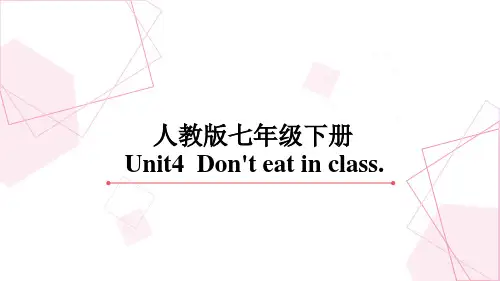
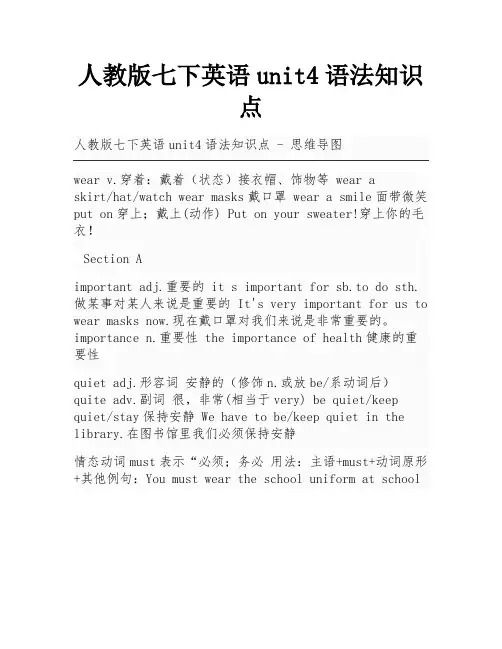
人教版七下英语unit4语法知识
点
wear v.穿着:戴着(状态)接衣帽、饰物等 wear a
skirt/hat/watch wear masks戴口罩 wear a smile面带微笑put on穿上;戴上(动作) Put on your sweater!穿上你的毛衣!
Section A
important adj.重要的 it s important for sb.to do sth.做某事对某人来说是重要的 It's very important for us to wear masks now.现在戴口罩对我们来说是非常重要的。
importance n.重要性 the importance of health健康的重
要性
quiet adj.形容词安静的(修饰n.或放be/系动词后)
quite adv.副词很,非常(相当于very) be quiet/keep quiet/stay保持安静 We have to be/keep quiet in the library.在图书馆里我们必须保持安静
情态动词must表示“必须;务必用法:主语+must+动词原形+其他例句:You must wear the school uniform at school。
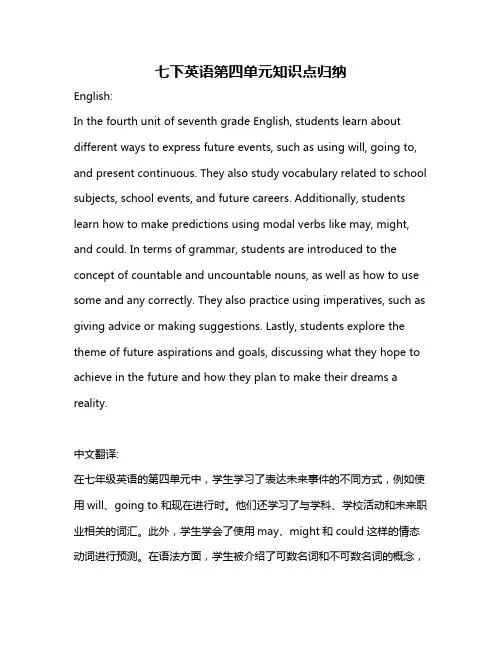
七下英语第四单元知识点归纳English:In the fourth unit of seventh grade English, students learn about different ways to express future events, such as using will, going to, and present continuous. They also study vocabulary related to school subjects, school events, and future careers. Additionally, students learn how to make predictions using modal verbs like may, might, and could. In terms of grammar, students are introduced to the concept of countable and uncountable nouns, as well as how to use some and any correctly. They also practice using imperatives, such as giving advice or making suggestions. Lastly, students explore the theme of future aspirations and goals, discussing what they hope to achieve in the future and how they plan to make their dreams a reality.中文翻译:在七年级英语的第四单元中,学生学习了表达未来事件的不同方式,例如使用will、going to和现在进行时。
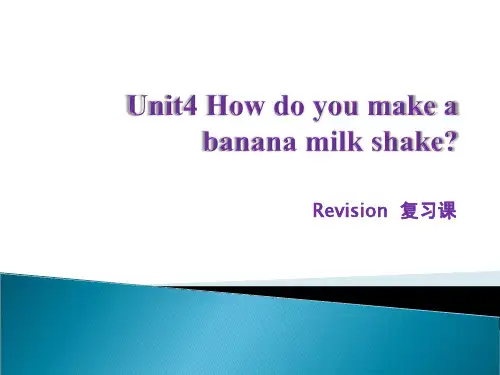
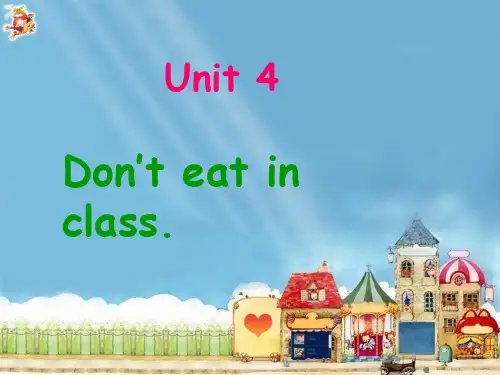
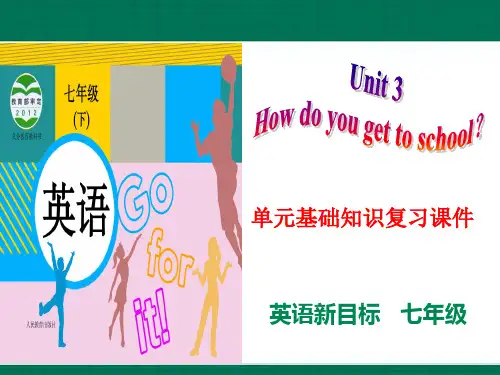
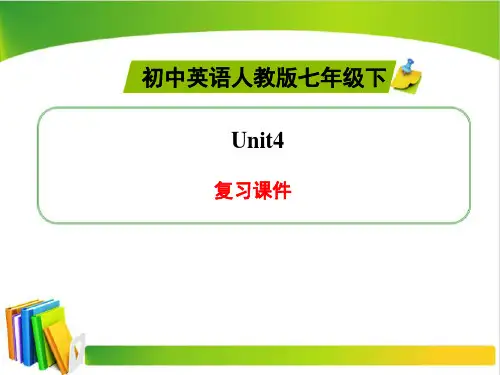

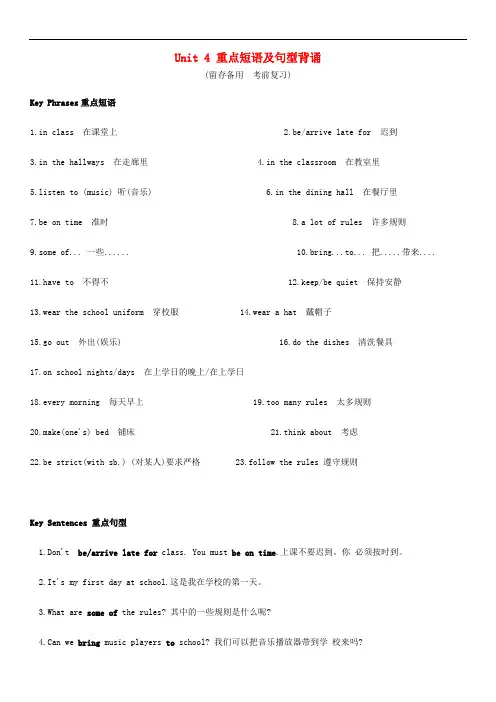
Unit 4 重点短语及句型背诵(留存备用考前复习)Key Phrases重点短语1.in class 在课堂上2.be/arrive late for 迟到3.in the hallways 在走廊里4.in the classroom 在教室里5.listen to (music) 听(音乐)6.in the dining hall 在餐厅里7.be on time 准时 8.a lot of rules 许多规则9.some of... 一些...... 10.bring...to... 把.....带来....11.have to 不得不 12.keep/be quiet 保持安静13.wear the school uniform 穿校服 14.wear a hat 戴帽子15.go out 外出(娱乐) 16.do the dishes 清洗餐具17.on school nights/days 在上学日的晚上/在上学日18.every morning 每天早上 19.too many rules 太多规则20.make(one's) bed 铺床 21.think about 考虑22.be strict(with sb.) (对某人)要求严格 23.follow the rules 遵守规则Key Sentences 重点句型1.Don't be/arrive late for class. You must be on time.上课不要迟到。
你必须按时到。
2.It's my first day at school.这是我在学校的第一天。
3.What are some of the rules? 其中的一些规则是什么呢?4.Can we bring music players to school? 我们可以把音乐播放器带到学校来吗?5.And we always have to wear the school uniform.我们总是得穿校服。
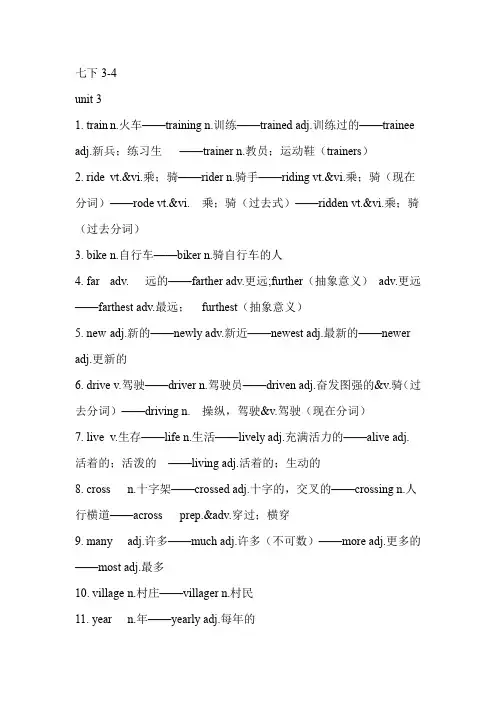
七下3-4unit 31. train n.火车——training n.训练——trained adj.训练过的——trainee adj.新兵;练习生——trainer n.教员;运动鞋(trainers)2. ride vt.&vi.乘;骑——rider n.骑手——riding vt.&vi.乘;骑(现在分词)——rode vt.&vi. 乘;骑(过去式)——ridden vt.&vi.乘;骑(过去分词)3. bike n.自行车——biker n.骑自行车的人4. far adv.远的——farther adv.更远;further(抽象意义)adv.更远——farthest adv.最远;furthest(抽象意义)5. new adj.新的——newly adv.新近——newest adj.最新的——newer adj.更新的6. drive v.驾驶——driver n.驾驶员——driven adj.奋发图强的&v.骑(过去分词)——driving n. 操纵,驾驶&v.驾驶(现在分词)7. live v.生存——life n.生活——lively adj.充满活力的——alive adj.活着的;活泼的——living adj.活着的;生动的8. cross n.十字架——crossed adj.十字的,交叉的——crossing n.人行横道——across prep.&adv.穿过;横穿9. many adj.许多——much adj.许多(不可数)——more adj.更多的——most adj.最多10. village n.村庄——villager n.村民11. year n.年——yearly adj.每年的12. likev.喜欢——likely adj.可能的——dislike v.不喜欢——unlike prep.不像——unlikely adj.不大可能的;难以置信的13. leave v.离开——left adj.剩下的——leaver n.离开者14. dream vi.梦想;做梦&n.梦——dreamy adj.如梦的——dreamily adv.梦幻般地——dreamer n. 做梦的人15. true adj.真正的——truly adv.真正——truth n.真理;真相——truthful adj.说实话的——truthless adj.不忠实的——truthfulness n.诚实Unit41. rule n.规则——ruler n.统治者&直尺2. arrive vi.到达——arrival n.到达3. listen vi.倾听——listener n.听众4. fight vt.&vi.战斗——fighting adj.战斗的——fighter n.战士5. outside adv.&adj.在外面——outsider n.局外人——outsides n.外部;外表——inside adj.里面的6. wear vt.穿着——wearable adj.可穿用的——worn adj.穿破的;用坏的7. important adj.重要的——importance n.重要性——importantly adv.重要地8. uniform n.制服——uniformed adj.穿制服的9. quiet adj.清净的——quietly adv.平静地——quietness n.安静——quieten vi.&vt.使安静10. out adv.在外;完全;出局——outer adj.外面的——outing n.远足;短途旅游;体育比赛11. practice n.练习——practical adj.实践的——practically adv.实际上——impractical adj.不切实际的12. more adv.更——much adj.很多(不可数)——many adj.很多(可数)——most adj.最多13. noisy adj.嘈杂的——noise n.噪音——noisily adv.嘈杂地14. relax vi.&vt.使轻松——relaxing adj.轻松的——relaxed adj.感到放松的——relaxation n. 放松15. read vt.&vi.阅读——reader n.读者——reading n.阅读16. terrible adj.糟糕的——terribly adv.非常;糟糕地——terribleness n.可怕17. feelv.——feeling n.感觉(可数)18. strict adj.严格的——strictly adv.严格地——strictness——n.严格——stricter adj.更严格的——strictest adj.最严格的19. remember vt.&vi 记忆——remembrance n.记忆力20. follow vt.&vi——following adj.后面的——follower n.跟随者21. luck n. 幸运——lucky adj.幸运的——luckily adv.幸运地——unluckily adv.不幸地22. keep v.保持——keeper n.保管者;饲养员23, hair n.头发——hairy adj.多毛的24.learn vt.&vi 学习——learning n.学问,学术——learner n.学习者Unit 3一、重点短语1. ride a bike 骑自行车2. take the subway/train/plane/bus to sp=go to sp bysubway/train/plane/bus乘坐地铁/火车/飞机/公交车去..go to sp on a subway /train/plane/bus3.take a car/boat/taxi to sp = go to sp by car/boat/taxi 乘坐小车/船/出租车去..go to sp in a car/boat/taxi4.fly /drive/ride to sp 坐飞机/开车/骑车去...5. walk to sp =go to sp on foot 走路去..6. It takes sb. some time to do sth. 花某人多长时间做某事It为形式主语,to do不定式为真正主语7. live in 居住在....live with sb 和某人一起住8.two hundred students 两百个学生注:前面有基数词时,hundred无复数hundred s of students 成百上千的学生无具体数字时,hundred 加s,需加of9.thanks for doing sth 谢谢做某事10.an 11-year-old boy 一个11岁大的男孩注:有连字符时,中间名词必须用单数11.think of 认为what do you think of/about sth?=How do you like sth?你认为..怎么样?12.cross =go/walk/run cross 从...表面通过13.go on a ropeway 坐索道14.between...and... 在...和..之间15.be afraid of ...害怕...be afraid of doing sth be afraid to do sth 害怕做某事16.be like/look like 像.../ 看起来像... 注: like表示“像”时为介词,无三单17.leave home 离开家leave (sp ) fo r sp (离开某地)前往某地e true实现,变成现实注true的书写,come true 主语为梦想,理想等19.far(away)from 离...远二、重点句型1、How do you get to school? 你怎样到达学校?I ride my bike. 我骑自行车。
初一英语Unit 4 Where is my backpack? 人教版(新目标)【本讲教育信息】一. 教学内容:Unit 4 Where is my backpack?二. 语言目标:(Language Goals)Talk about where things are. (谈论物品在哪儿)三. 语言功能:以谈论房子里的物品为话题,学会用英语询问和回答“东西在哪里”。
四. 重点句型:1. Where is the baseball?It’s in the backpack.Where are his keys?They’re on the dresser.2. Is the baseball on the sofa?No, it isn’t.Are the books on the bed?Yes, they are.3. There is a puter on my desk.There are books in the bookcase.五. 重点词汇短语:table,bed,dresser,bookcase,sofa,chair,pencil case,math book,alarm clock,video cassette,puter game,behind,under,next to,between六. 语法:1. where问句。
2. Yes / No 问句及其简单回答。
3. 静态的方位介词on,in等的用法。
4. 定冠词the的用法。
七. 重、难点解析:1. 当我们想知道某人或某物在哪儿时,如何提问?Where is / are + … ?当我们想知道某个物品在哪儿时,我们通常用Where is / are … ?句型来提问。
如:Where is my backpack?△where 是疑问副词,意思是在哪里,后面用一般疑问句句型。
△当询问的物品数量为单数时,其前的be 动词应使用is ,因为该物品在问句中提到过,所以回答时用代词it 代替该物品。
Unit4【重点单词】1.rule 规则、规章2.hall 大厅、礼堂3.listen 听,倾听4.sorry 抱歉的,难过的,惋惜的5.wear 穿,戴6.bring 带来、取来7.quiet 安静的8.practice 练习9.before 在…..以前10.kitchen 厨房11.noisy 吵闹的12.read 读,阅读13.feel 感觉;觉得14.remember 记住,记起15.keep 保持保留16.learn 学习学会17.arrive 到达18.dining 餐厅19.fight 打架,战斗20.outside 在外面21.important 重要的22.uniform 校服、制服23.out 外出24.dish 碟子盘子25.dirty 脏的26.more 更多的27.relax 放松休息28.terrible 非常讨厌的可怕的29.strict 严格的严厉的30.Follow 遵循,跟随31.Hair 头发,毛发*【重点短语】Listen to 听…..be late for class 上课迟到do the dishes 清洗餐具every day 每天in class 课堂上too many rules 太多规则go out 外出(娱乐)dining hall 餐厅have to 不得不be strict(with sb.)(对某人)要求严格(be)on time 准时after school 放学后follow the rules 遵守规则at school 在学校在上课*【日常用语归纳】1.向对方询问规章制度,看自己能否做某事Can we wear hates?What are the rules at your school?What else do you have to do?2、表示许可或不允许做某事You can’t eat in the classroom.We can eat in the cafeteria.We don’t have to wear a school uniform.Don’t eat in class.*【语法】1、祈使句Don’t……2、Can用于表示请求Can I/we…..?3、情态动词must和have to的用法*【语言知识精讲】:【Class 】班级,一节课,全班同学Class用作名词。